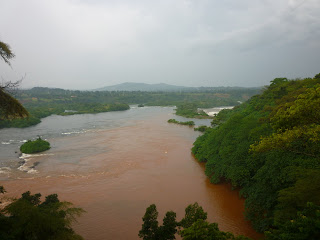










As I ride out of town the shimmering rim of the eastern sun blazes low between the silhouettes of two distant Acacias and the first rays of yellow light flash across the flat scrubland. I am stopped at a police post on the edge of town and told it is better to take a truck. The guard walks around the bicycle and looks curiously at me. He asks if I have a weapon. He lets me pass.
The road is empty and on the new tar, with the wind behind me, I ride quickly. Large swathes of the dry copper earth lie bare and the sun glints off the corrugated roofs of small clusters of rectangular houses. To the west a bank of purple rock bridges the scrub and a low pool of receding grey clouds. Soon I am crossing the Ewaso Nyiro River and am at the town of Archer’s Post. The police here tell me there has been no sign of trouble for some days. The guard points to two hills in the distance and tells me to be carful here. Bandits hide in the bush there and make ambush. Even the MP for the area, he has been attacked between these two hills.
Out of Archer’s Post the tar stretches straight for miles ahead and disappears in the vast orange flats. Ostrich on the road quicken their pace as I approach and scatter powerfully across the sand as I pass. Dic-dic stand alert in the dry bush and a lone eagle rises and falls with the currents of the empty sky. I ride on and pass two large mounds of bare stone that looked so small in the distance from Archer’s Post. I hear the faint hum of an approaching vehicle breach the desert silence. A man on a motorbike passes and waves. He has a rifle slung across his chest. It is hot now, and even with the wind behind me, the sweat is pouring from my forid as I stare at the waves of heat rising from the black tar.
By mid morning I am riding across a rough dusty stretch through a village. Small stone huts and rickety shelters made of tangled branches line the road. Samburu warriors walk bare-chested in twos and threes, marking each stride by pressing their spears into the dust. They turn as I pass and stare silently at me. I smile and stare back. They wear bright robes from the waist down and sandals made from tyres on their feet. Each man has a dagger sheathed in red leather strapped to his thigh. A chain of golden beads runs from large wooden earings that hang heavily from each lobe and passes across their faces between the nose and mouth. Some are bare-headed, others wear helmets with bright red plumes the shape of mohicans running from their foreheads to the back of their necks.
Women in long red and blue robes with rows and rows of beads, hanging from their necks to their breasts, carry buckets of water to their huts. Scruffy kids in torn shorts, with anklets tied loosely above bare feet, peek at me from the safety of their huts and disappear shyly as I wave. There are soldiers in green camouflage ambling up the road holding worn rifles and goats searching for scraps in the dust.
A man runs into the road in front and tells me I must not continue. He says between here and Laisamis the road is very dangerous. He says a Chinese road worker was shot just 6km from here. He says an American cyclist was assaulted between here and Merille. They didn’t steal anything from him, but they broke both his thumbs and smashed his shoulder. The sun is scorching now and I take a long gulp of water. I wheel my bike into the shade and light a cigarette. ‘You will wait here for a truck. It is better.’ I feel sad and try to summon the will to continue, but guilt, when I think of home, and dread, swallow my faltering courage.
A tall woman in long white robes comes out of her house and nods and smiles. She tells me they do not often get visitors here. ‘We like visitors. You stay as long as you need.’ Her daughter brings me a bowl of beans and ugali and sits in silence as I eat. She smiles when I finish the plate and asks if she may give me a thing. A necklace of multi-coloured beads slips from her fingers and she stands on tip-toes and ties it round my neck.
I sit for hours waiting for a truck, but none pass. The children gradually get used to me and poke at my beard and laugh and stare at the bicycle in wonder. Night falls and I drift into sleep on an old sofa, amidst the low murmurs of those sitting around me. I am woken in the middle of the night and told a truck is outside. It is all very rushed and I am ushered through the darkness and hoisted onto the open back of a metal framed lorry. There is an old Muslim lady wrapped in a rug on top of the crates and a man with an AK47 keeping watch on the front. Soon I am hurtling through the night towards Moyale with a hundred crates of beer beneath me, staring up at all the stars of the desert sky.







